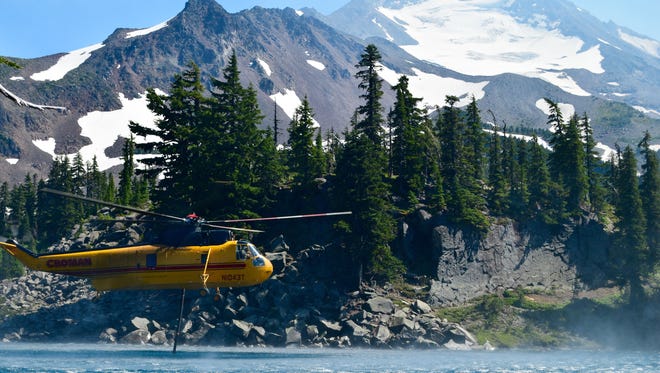Wildfire closes Oregon campsites, hiking for eclipse

DETROIT, Ore. — Just two weeks ago, the Mount Jefferson area was expected to be among Oregon's most popular places to view the Aug. 21 solar eclipse.
But with the Whitewater Fire continuing to expand, U.S. Forest Service officials on Monday closed a large swath of land surrounding Oregon's second tallest mountain through eclipse day.
The closure includes almost 185 square miles of roads, trails and mountains in and around the Mount Jefferson Wilderness. It includes popular hiking destinations Jefferson Park, Pamelia Lake and 30 miles of the Pacific Crest Trail.
Tens of thousands of backpackers were expected to visit the Jefferson and Detroit Lake areas because they are smack in the middle of the eclipse's path of totality. Some had reservations to camp in the wilderness.
► July 26:'Eclipse blindness' is real. How to know safe solar eclipse glasses.
► July 21:Flip-flop wearing hikers, fire danger could cause chaos during solar eclipse
“We understand this is a disappointment to those who looked forward to experiencing the eclipse in this area," Forest Supervisor Tracy Beck said in a news release. "Unfortunately, the risk is too great, and our highest responsibility must be visitor safety."
The Whitewater Fire was at almost 9 square miles Tuesday and is expected to continue growing, perhaps to the north or southwest, officials said. None of it has been contained.

The fire began with a lightning strike to a tree in the Whitewater Creek area that had been smoldering since June, said Marcus Kauffman, a biomass resource specialist at the Oregon Department of Forestry. The tree fell down July 23 and ignited a pile of brush and timber.
Because the fire is burning in steep terrain that isn't accessible to heavy equipment, crews don't expect to have it contained for as many as three months.
A forecast that includes the possibility of dry thunderstorms this week adds to the uncertainty.
"We're not expecting much lightning, which is good," Whitewater Fire spokeswoman Jeanne Klein said. "The biggest concern is gusty winds that could twist the fire any which way."
Officials said they see little danger of the fire ever reaching nearby Detroit, a community of a few more than 200 residents that is about 13 miles east of the wildfire's origins and about 60 miles southeast of Portland by air.
Instead, they're focused on keeping the blaze from hitting the Breitenbush community, Marion Forks and Oregon 22. All are now within 3 to 5 miles of the fire line.
Total personnel on the fire has almost doubled to 619 with 18 crews and multiple pieces of heavy machinery building containment lines around the blaze.
The closure stretches from the top of Mount Jefferson Wilderness near Breitenbush Lake, along Oregon 22, Forest Service Road 46 and south to Minto Pass.
Follow Zach Urness on Twitter: @ZachsORoutdoors
